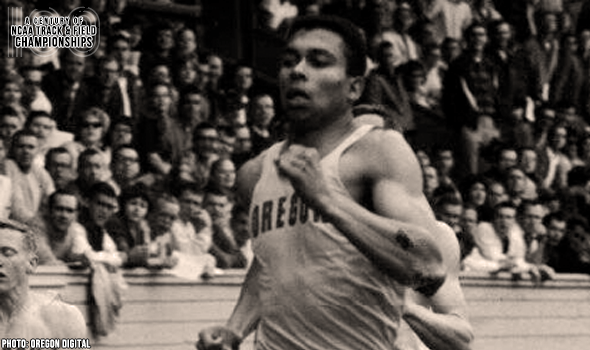
Oregon’s Jerome Sprinted To NCAA Glory
If ever a meet could have used photo-finish timing, it was the 1964 NCAA Outdoor Track & Field Championships.
The 5000 and 400 were both ruled deadlocks, but those were with merely two runners inseparable.
The 100-meter final saw three sprinters crossing the line at almost the same instant: Harry Jerome of Oregon, Edwin Roberts of North Carolina Central and Trenton Jackson of Illinois.
It took almost an hour to sort the finish, but when they did, Jerome was ruled the victor in 10.1. Roberts (second) and Jackson (third) were also credited with that same mark as well.
“Honestly, that’s one I’d hate to judge on,” Jerome said about the finish to Dick Leutzinger of the Eugene Register-Guard. “Usually I know when I win or lose. I’d hate to say on that one.”
While the 10.1 was a meet and collegiate record, it wasn’t a PR for Jerome. He still owned a share of the world record of 10.0 that he set in the summer after his freshman season back in 1960.
Jerome was a Canadian prodigy who came from great lineage. As a high school standout in North Vancouver, British Columbia, he broke a 31-year-old national record in the 220 yards. And many knew his grandfather, John Armstrong Howard, who was the first Black athlete to represent Canada in the Olympic Games.
The fact that Jerome was even running in 1964 – near his best, let alone at all – was a comeback story for the ages. Jerome tore his quadriceps tendon in the fall of 1962 at the British Commonwealth Games and the seriousness of the injury led many to believe that he would never run again. He didn’t believe that and a little over a year later, he opened the 1964 season by equaling the world indoor best in the 60-yard dash with his time of 6.0.
Then at the 1964 NCAA Championships, Jerome doubled back in the 200, taking third to lead Oregon to its second team title in three years – both at Hayward Field. The Ducks won their first national title in 1962 when Jerome won the 220 yards and was runner-up in the 100.
Not long after that, Jerome went to the Tokyo Olympic Games, where he earned his lone Olympic medal – a bronze in the 100.
Jerome died in 1982 of a brain aneurysm at age 42. In 1984, the Labatts Classic held in Burnaby was renamed the Harry Jerome Classic and in 1988 a statue of him was erected in Vancouver’s Stanley Park.
The NCAA and collegiate track & field will mark a momentous milestone in the spring of 2021 -- the 100th anniversary of the NCAA Championships and with that, the NCAA Track & Field Championships. In June 1921, the University of Chicago hosted the first track & field championships in NCAA history.
This point can’t be emphasized enough: Not only was the event the first for NCAA track & field, but the first championships for any sport under the sponsorship of the NCAA.
To celebrate, over each of the next 365 days, the U.S. Track & Field and Cross Country Coaches Association (USTFCCCA) will celebrate moments, student-athletes, and coaches that have made a century’s worth of championships special. From humble beginnings to important historical milestones to the modern-day, collegiate track & field has evolved with the American society.
The 2021 edition of the NCAA Division I Outdoor Track & Field Championships begin with preliminary round action on May 27-29 in Jacksonville, Fla., and College Station, Texas. The championships final site and culmination of the celebration is slated for June 9-12, 2021 at the newly rebuilt Hayward Field in Eugene, Ore.

Thomas Gives NCAA Meet First 7-Footer
John Thomas of Boston University was the first athlete to clear 7 feet in the high jump at the NCAA Outdoor Track & Field Championships.

Lindgren Had No Peer In NCAA
Gerry Lindgren of Washington State swept the 3-mile/5K & 6-mile/10K at the NCAA Outdoor Championships three consecutive times between 1966 and 1968.

UCLA’s Acuff Ascends To Record Heights
Amy Acuff of UCLA set a still-standing meet record in the high jump at the NCAA Outdoor Track & Field Championships in 1995.

“Invincible” Randy Matson Dominates The Throws
Randy Matson of Texas A&M set multiple world records in the shot put and dominated that event and the discus in the collegiate scene.

Texas’ Reid Unrivaled At 400 Meters
Suziann Reid of Texas is the only athlete in NCAA history – regardless of division – with three 400-meter crowns and four 4×400 relay titles.

For The Helds, The Javelin Is A Family Affair
Bud Held of Stanford is one of only two men in NCAA DI history to win three consecutive javelin titles at the NCAA Outdoor Championships.

The 440-220 Double Is So Nice, McKenley Did It Twice
Herb McKenley of Illinois completed the difficult 440-220 double twice at the NCAA Outdoor Championships.

Davis Rolls To Collegiate Record In 1989
Pauline Davis of Alabama set a collegiate record of 50.18 in the 400 Meters at the 1989 NCAA Division I Outdoor Track & Field Championships.

Dillard Hurdles To NCAA, World Glory
Harrison Dillard won the 120-yard and 220-yard hurdles in back-to-back years in 1946 and 1947.

Simpson Sprints To All-Time Mark In 1929
In 1929, George Simpson of Ohio State was so far ahead of his time that he set a world record in the 100 yards that couldn’t be ratified.

